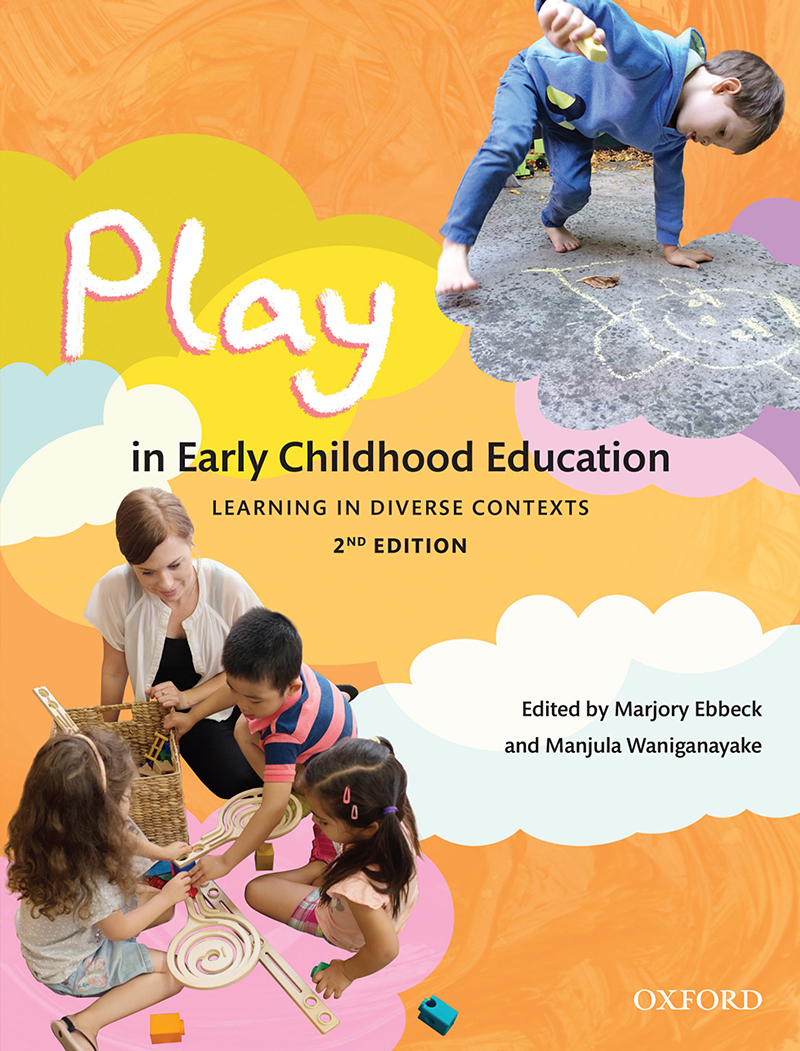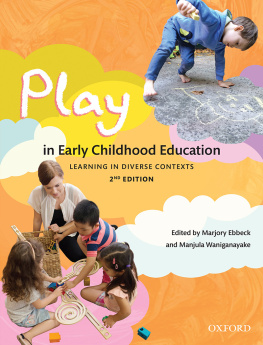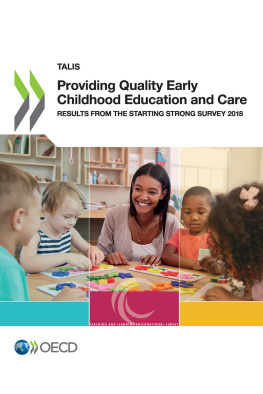Marjory Ebbeck - Play in Early Childhood Education
Here you can read online Marjory Ebbeck - Play in Early Childhood Education full text of the book (entire story) in english for free. Download pdf and epub, get meaning, cover and reviews about this ebook. year: 2016, genre: Children. Description of the work, (preface) as well as reviews are available. Best literature library LitArk.com created for fans of good reading and offers a wide selection of genres:
Romance novel
Science fiction
Adventure
Detective
Science
History
Home and family
Prose
Art
Politics
Computer
Non-fiction
Religion
Business
Children
Humor
Choose a favorite category and find really read worthwhile books. Enjoy immersion in the world of imagination, feel the emotions of the characters or learn something new for yourself, make an fascinating discovery.
- Book:Play in Early Childhood Education
- Author:
- Genre:
- Year:2016
- Rating:5 / 5
- Favourites:Add to favourites
- Your mark:
- 100
- 1
- 2
- 3
- 4
- 5
Play in Early Childhood Education: summary, description and annotation
We offer to read an annotation, description, summary or preface (depends on what the author of the book "Play in Early Childhood Education" wrote himself). If you haven't found the necessary information about the book — write in the comments, we will try to find it.
Play in Early Childhood Education — read online for free the complete book (whole text) full work
Below is the text of the book, divided by pages. System saving the place of the last page read, allows you to conveniently read the book "Play in Early Childhood Education" online for free, without having to search again every time where you left off. Put a bookmark, and you can go to the page where you finished reading at any time.
Font size:
Interval:
Bookmark:


in Early Childhood Education

in Early Childhood Education
Learning in diverse contexts
Second Edition
Edited by
Marjory Ebbeck
and
Manjula Waniganayake


Oxford University Press is a department of the University of Oxford.
It furthers the Universitys objective of excellence in research,
scholarship, and education by publishing worldwide. Oxford is a registered
trademark of Oxford University Press in the UK and in certain other
countries.
Published in Australia by
Oxford University Press
253 Normanby Road, South Melbourne, Victoria 3205, Australia
Marjory Ebbeck and Manjula Waniganayake 2016
The moral rights of the authors have been asserted.
First edition published 2010
Second edition published 2016
All rights reserved. No part of this publication may be reproduced, stored in a retrieval system,
or transmitted, in any form or by any means, without the prior permission in writing of Oxford
University Press, or as expressly permitted by law, by licence, or under terms agreed with the
appropriate reprographics rights organisation. Enquiries concerning reproduction outside the scope
of the above should be sent to the Rights Department, Oxford University Press, at the address above.
You must not circulate this work in any other form and you must impose this same condition on any acquirer.
National Library of Australia Cataloguing-in-Publication entry
Creator: Ebbeck, Marjory A., author. Title: Play in early childhood education :
learning in diverse contexts / Marjory Ebbeck, Manjula Waniganayake.
Edition: Second edition.
ISBN 9780190303211 (paperback)
Notes: Includes index.
Subjects: Early childhood educationAustralia. PlayPsychological aspects.
Child developmentAustralia.
Other Creators/Contributors:
Waniganayake, Manjula, author.
Dewey Number: 372.210994
Reproduction and communication for educational purposes

The Australian Copyright Act 1968 (the Act) allows a maximum of one chapter
or 10% of the pages of this work, whichever is the greater, to be reproduced
and/or communicated by any educational institution for its educational purposes
provided that the educational institution (or the body that administers it) has
given a remuneration notice to Copyright Agency Limited (CAL) under the Act.
For details of the CAL licence for educational institutions contact:
Copyright Agency Limited
Level 11, 66 Goulburn Street
Sydney NSW 2000
Telephone: (02) 9394 7600
Facsimile: (02) 9394 7601
Email: info@copyright.com.au
Edited by Sandra Balonyi
Cover design by Zeigler Design
Text design by Jennai Lee-Fai
Typeset by Newgen KnowledgeWorks Pvt. Ltd., Chennai, India
Proofread by Vanessa Lanaway
Indexed by Nikki Davis
Printed in China by Leo Paper Products Ltd.
Links to third party websites are provided by Oxford in good faith and for information only.
Oxford disclaims any responsibility for the materials contained in any third party website
referenced in this work.
Contents
Marjory Ebbeck and Manjula Waniganayake
Marjory Ebbeck
Marjory Ebbeck
Vicki Banham
Sheila Degotardi and Emma Pearson
Pirkko Hyvnen, Aili Helenius and Eeva Hujala
Romana Morda and Manjula Waniganayake
May-Yin Sirene Lim
Fred Ebbeck and Sanly Kam
Louise Porter
Sylvia D Reyes and Marjory Ebbeck
Karen Martin
Chanel Croker and Marjory Ebbeck
Alison Elliott
Bonnie Yim and Lai Wan Maria Lee
Kate Highfield
Qin Guo and Manjula Waniganayake
Foreword
Early childhood education has been the focus of a great deal of worldwide attention in recent years. Across organisations such as the Organisation for Economic Cooperation and Development (OECD), the World Bank and UNESCO, there is now consensus that children learn a great deal in the early years of life, that investing in high-quality early childhood education is of benefit not only to the children but to the long-term benefit for societies, and that the same investments contribute to breaking cycles of disadvantage. This worldwide interest has been accompanied by a considerable investment in early childhood education in countries such as Australia. Along with recognition of the importance of early childhood education has come increased accountability and scrutiny. If governments are prepared to invest heavily in early childhood education, there is an expectation that there will be demonstrable and measureable outcomes. In this context, attention has been directed to the role of play in early childhood curricula: if we know that the early childhood years are a time of significant learning and development, why do we not capitalise on this and institute strong teaching programs?
Confronted with arguments such as this, early childhood educators are called upon to explain and defend the role of play in childrens learning and development. This can be challenging, as play is itself an elusive concept: we know when were playing and are often able to recognise when others are playing, yet have difficulty defining what constitutes play and attributing specific outcomes to play experiences. Partly, this is because play and playing can mean different things for different people, and play looks different for different children, within and among different families, communities and educational settings.
Despite this, there is consensus that play and learning often go hand in hand for children, particularly young children, and that play pedagogies are core features of early childhood education. This has a range of implications for educators and the educational environments they create. The first of these is that educators need to have considered their own perspectives, understandings and expectations of play. Educators require sophisticated and nuanced understandings of playmoving well beyond slogans such as play is the childs work. Such understandings will be based on profound knowledge and critique of the theoretical bases of play, informed by reflection and understandings of context, as well as their own experiences.
A second implication is that educators need to draw on these understandings to articulate their approaches to play, and the connections between play and learning, within specific early childhood settings. In many ways, educators will be advocates for playwith children, families, other professionals, and within communities. However, it is important to note that advocating for play does not translate to blind acceptance of play as the only way children learn, or as the preferred mode of learning for all children. Rather, advocating for play requires awareness of the potential benefits as well as the potential limitations of play, the challenges as well as the excitement it can create, and acceptance of the notion that play can sometimes be a negative experience.
As they engage with this book, readers will be challenged to reflect on their understandings of play and their role as educators to construct and create play environments that are engaging and responsive, challenging yet supportive. In reflecting on their own experiences of play and the experiences of children in many diverse contexts, they will be introduced to some of the tensions that surround play and learning, including the place of play within different curriculum frameworks and approaches; differences and/or similarities in adult and child perspectives of play; and the affordance of play in diverse environments and community contexts. As they peruse the chapters, readers will encounter arguments that the changing nature of westernised societies has resulted in changes to childrens play and to the educational value ascribed to play. Further reading will introduce counterargumentsthat changes in childrens play do not necessarily represent a diminished engagement in playand evidence that children manage both play and other approaches to learning and participation without problems. These arguments are complementedand complicatedby evidence from diverse social and cultural settings.
Font size:
Interval:
Bookmark:
Similar books «Play in Early Childhood Education»
Look at similar books to Play in Early Childhood Education. We have selected literature similar in name and meaning in the hope of providing readers with more options to find new, interesting, not yet read works.
Discussion, reviews of the book Play in Early Childhood Education and just readers' own opinions. Leave your comments, write what you think about the work, its meaning or the main characters. Specify what exactly you liked and what you didn't like, and why you think so.




